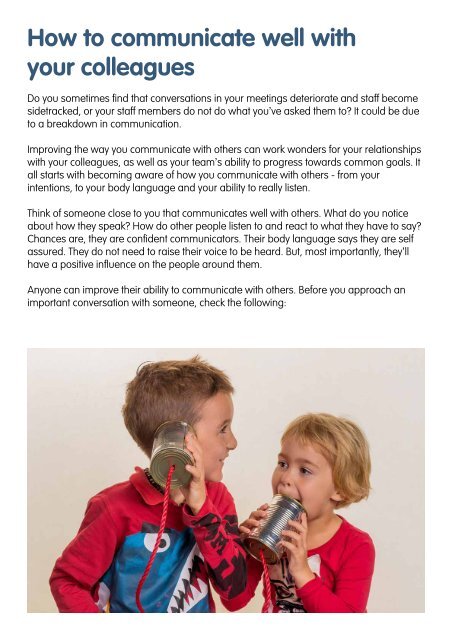Parenta Magazine November 2015
Create successful ePaper yourself
Turn your PDF publications into a flip-book with our unique Google optimized e-Paper software.
How to communicate well with<br />
your colleagues<br />
Do you sometimes find that conversations in your meetings deteriorate and staff become<br />
sidetracked, or your staff members do not do what you’ve asked them to? It could be due<br />
to a breakdown in communication.<br />
Improving the way you communicate with others can work wonders for your relationships<br />
with your colleagues, as well as your team’s ability to progress towards common goals. It<br />
all starts with becoming aware of how you communicate with others - from your<br />
intentions, to your body language and your ability to really listen.<br />
Think of someone close to you that communicates well with others. What do you notice<br />
about how they speak? How do other people listen to and react to what they have to say?<br />
Chances are, they are confident communicators. Their body language says they are self<br />
assured. They do not need to raise their voice to be heard. But, most importantly, they’ll<br />
have a positive influence on the people around them.<br />
Anyone can improve their ability to communicate with others. Before you approach an<br />
important conversation with someone, check the following:<br />
What does your body language say?<br />
If your body language reflects that you<br />
are tense or anxious (for instance - arms<br />
crossed, head down, not making eye<br />
contact), it may put your conversation on<br />
the wrong foot. Instead: stand tall, raise<br />
your head high, relax your shoulders and<br />
breathe slowly and deeply to project an air<br />
of confidence. Sometimes it can help to<br />
imagine yourself somewhere you find<br />
tranquil, like being on a beach, as it will<br />
make your muscles automatically relax.<br />
Check your intentions<br />
If you have a positive intention in mind<br />
before the conversation, you may find it<br />
easier to find the words you’re trying to<br />
express. Check that you’re not trying to<br />
get what you want at the expense of<br />
someone else.<br />
Perspective<br />
Try to place yourself in someone else’s<br />
shoes, and see where they’re coming from<br />
if they have an opposing viewpoint to<br />
yours. Approaching the situation from their<br />
perspective will help you understand their<br />
motivations, be in a better position to<br />
confront their objections and hopefully<br />
work towards a compromise.<br />
Do you have a clear outcome?<br />
In order to establish a clear purpose to the<br />
conversation, ask yourself what you’d like to<br />
happen. Focus on what would be the ideal<br />
result to come out of you speaking with the<br />
other person. It may help to write this down<br />
beforehand, so it’s clear in your mind.<br />
Really listen to the other person<br />
Many of us subconsciously stop listening<br />
to what someone else is saying because<br />
we’re already thinking about what we want<br />
to say next. The most precious thing you<br />
can give someone is you’re undivided<br />
attention, without interrupting.<br />
Communicating well with others is a skill<br />
which can be practised, improved and<br />
honed over time. It all starts with having<br />
self awareness. Although applying some<br />
of these changes may feel uncomfortable<br />
or unnatural at first, if you stick with them<br />
you’ll see a gradual improvement in the<br />
quality of your communication with others.<br />
And what’s more, happy staff who<br />
communicate well with each other<br />
makes for a much happier happy setting!

















